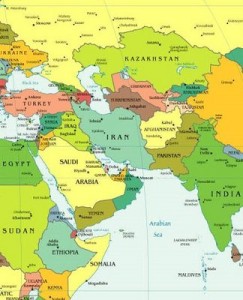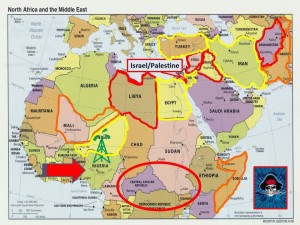 Russia Invades Ukraine: BAD — U.S. Invades Iraq: Good
Russia Invades Ukraine: BAD — U.S. Invades Iraq: Good
Veterans Today, 6 March 2014

This essay (also attached below, argues that Syrian civil war places the contradictions in US/UK foreign policy into sharp relief.
Chuck Spinney
We can get rid of Assad or fight al-Qaeda, but we can’t do both
To get a proper picture of the Syrian conflict, the West needs to listen to its enemies
By Peter Oborne, Telegraph [UK]
9:24PM GMT 26 Feb 2014
Continue reading “Chuck Spinney: Amateur Hour? Or Corrupt Idiots in Power in Washington?”

India-Afghanistan: Indian Minister of External Affairs Slaman Khurshid said on 15 February that India will provide helicopters to Afghanistan.
“We are giving them helicopters and we will be supplying them very soon,” Khurshid told reporters accompanying him on a day-long visit to the Afghan city of Kandahar, where he inaugurated an agricultural university built with Indian aid. “We also have been giving them some logistical support and we hopefully will be able to upgrade and refurbish their transport aircraft.”
Khurshid did not specify the number or type of helicopters to be provided to Afghanistan. Nor did he elaborate on transport aircraft contracts.

Inflection points in history are usually very difficult to see until well after they have occurred. Jonathan Cook, one of the most astute observers of the Palestinian Question, argues that one may be at hand wrt to the Palestinian Question. To me, this seems incredible, but we live in interesting times. CS
Pariah Status and Isolation Lie Ahead
The Tide Turns Against Israel
by JONATHAN COOK, Counterpunch, 13 Feb 2014
Nazareth
Israeli prime minister Benjamin Netanyahu has rarely been so politically embattled. His travails indicate the Israeli right’s inability to respond to a shifting political landscape, both in the region and globally.
The context for his troubles was his commitment in 2009, under great pressure from a newly elected US president, Barack Obama, to support the creation of a Palestinian state. It was a concession he never wanted to make and one he has regretted ever since.
The US secretary of state, John Kerry, has exploited that pledge by imposing the current peace talks. Now Netanyahu faces an imminent “framework agreement” that may require him to make further commitments towards an outcome he abhors.
Mahmoud Abbas, the head of the Palestinian Authority, is not helping. Rather than digging in his own heels, he offers constant accommodation. Last week Abbas told the New York Times that Israel could take a leisurely five years removing its soldiers and settlers from a key piece of Palestinian territory, the Jordan Valley. The Palestinian state would remain demilitarised, while Nato troops could stay “for a long time, and wherever they want”.
The Arab League is another thorn. It has obliged by renewing its offer from 2002, the Arab Peace Initiative, that promises Israel peaceful relations with the Arab world in return for its agreement to Palestinian statehood.
Meanwhile, the European Union is gently turning the screws on the occupation. It regularly trumpets condemnation of Israel’s settlement-building frenzies, including last week’s announcement of 558 settler homes in East Jerusalem. And in the background sanctions loom over settlement goods.
European financial institutions are providing a useful barometer of the mood among the 28 EU member states. They have become the unexpected pioneers of the boycott, divestment and sanctions (BDS) movement, with a steady trickle of banks and pension funds pulling out their investments in recent weeks.
Pointing out that boycotts and “delegitimisation” campaigns are only going to gather pace, Kerry has warned that Israel’s traditional policy is “unsustainable”.
That message rings true with many Israeli business leaders, who have thrown their weight behind the US diplomatic plan. They believe that a Palestinian state is the key to Israel gaining access to lucrative regional markets and continued economic growth.
Netanyahu must have been disconcerted by the news that among those meeting Kerry to express support at the World Economic Forum in Davos last month was Shlomi Fogel, the prime minister’s long-time intimate.
Pressure on these various fronts may explain Netanyahu’s hasty convening last weekend of his senior ministers to devise a strategy to counter the boycott trend. Proposals include a $28 million media campaign, legal action against boycotting institutions, and intensified surveillance of overseas activists by the Mossad.
On the domestic scene, Netanyahu – who is known to prize political survival above all other concerns – is getting a rough ride as well. He is being undermined on his right flank by rivals inside the coalition.
Naftali Bennett, the settlers’ leader, provoked a chafing public feud with Netanyahu this month, accusing him of losing his “moral compass” in the negotiations. At the same time, Avigdor Lieberman, the foreign minister from the far-right Yisrael Beiteinu party, has dramatically changed tack, cosying up to Kerry, whom he has called “a true friend of Israel”. Lieberman’s unlikely statesmanship has made Netanyahu’s run-ins with the US look, in the words of a local analyst, “childish and irresponsible”.
It is in the light of these mounting pressures on Netanyahu that one should understand his increasingly erratic behaviour – and the growing rift with the US.
A damaging falling-out last month, following insults from the defence minister against Kerry, has not subsided. Last week Netanyahu unleashed his closest cabinet allies to savage Kerry again, with one calling the US secretary of state’s pronouncements “offensive and intolerable”.
Susan Rice, Obama’s national security adviser, tweeted her displeasure with a shot across the bows. The Israeli government’s attacks were “totally unfounded and unacceptable”, she noted. Any doubt she was speaking for the president was later dispelled when Obama praised Kerry’s “extraordinary passion and principled diplomacy”.
But despite outward signs, Netanyahu is less alone than he looks – and far from ready to compromise.
He has the bulk of the Israeli public behind him, helped by media moguls like his friend Sheldon Adelson who are stoking the national mood of besiegement and victimhood.
But most importantly he has a large chunk of Israel’s security and economic establishment on side too.
The settlers and their ideological allies have deeply penetrated the higher ranks of both the army and the Shin Bet, Israel’s secret intelligence service. The Haaretz newspaper revealed this month the disturbing news that three of the four heads of the Shin Bet now subscribe to this extremist ideology.
Moreover, powerful elements within the security establishment are financially as well as ideologically invested in the occupation. In recent years the defence budget has rocketed to record levels as a whole layer of the senior military exploits the occupation to justify feathering its nest with grossly inflated salaries and pensions.
There are also vast business profits in the status quo, from hi-tech to resource-grabbing industries. Indications of what is at stake were illuminated recently with the announcement that the Palestinians will have to buy from Israel at great cost two key natural resources – gas and water – they should have in plentiful supply were it not for the occupation.
With these interest groups at his back, a defiant Netanyahu can probably face off the US diplomatic assault this time. But Kerry is not wrong to warn that in the long term yet another victory for Israeli intransigence will prove pyhrrhic.
These negotiations may not lead to an agreement, but they will mark a historic turning-point nonetheless. The delegitimisation of Israel is truly under way, and the party doing most of the damage is the Israeli leadership itself.
Jonathan Cook won the Martha Gellhorn Special Prize for Journalism. His latest books are “Israel and the Clash of Civilisations: Iraq, Iran and the Plan to Remake the Middle East” (Pluto Press) and “Disappearing Palestine: Israel’s Experiments in Human Despair” (Zed Books). His website is www.jonathan-cook.net.
A version of this article first appeared in The National, Abu Dhabi.
Phi Beta Iota: Zionism, and Zionist Israel, are not to be confused with Jews, or loyal American Jews — just as America the Beautiful is not be to confused with the treasonous betrayal of the public trust by the two-party tyranny in the USA, and the global financial crimes it has legalized, or the elite pedophilia it turns a blind eye to. Society is vastly more complex than a mere government. What is happening in the Internet era is the isolation of corrupt government — as John Perrry Barlow foresaw in 1992, the public is now starting to route around corrupt governments.
See Also:
 US Dirty Modus Operandi in Middle East: “Regime Change” Everywhere It Can
US Dirty Modus Operandi in Middle East: “Regime Change” Everywhere It Can
The 9/11 incident has polarized global politics into two distinct eras: pre-9/11 period and post-9/11 period with the latter wreaking havoc on the entire world, particularly on the Muslim world.

The pre-9/11 era witnessed terrorism, carnage, and mass murder across the globe on the part of the US government. Their atrocities ranged from the Philippines to Vietnam and Japan and any mentionable places on the planet.
However, the post-9/11 discourse changed drastically. The US emerged as the victim and the entire Muslim world was shown to be the guilty party.
In other words, the post-9/11 era provided the US government with a pretext to wage a war on terror or to put it more precisely, to wage a crusade against the Muslim world and to accelerate and vindicate their efforts in destabilizing regional strategic governments, thereby drawing nigh to their monstrous objectives.
In point of fact, the Muslims are bearing the brunt of a tragedy carefully choreographed by Washington with the express intention of spearheading a sinister agenda in the Middle East which is evidently ‘regime change’ on a massive scale.
Continue reading “4th Media: US “Regime Change” Makes US “Great Satan””

I am writing to pass along to you a story from Argentina which, in addition to the story itself, says much about the nature of Chinese engagement in the region, including how the Chinese approach to pursuing business and political objectives in the region differs from that of the US.
For me, the story below illustrates well the nuances, contradictions and complexity of Chinese engagement in the region: here, it is not the Chinese who are behaving badly, but rather, their partners. The Chinese are powerfully exercising influence, yet using informal channels and indirect pressures, rather than public conditions and demands. The Chinese are both attempting to “save face” for their partner, and yet also indirectly show their ire when they themselves ‘lose face.” And finally, a reminder that the dynamics of the China-Latin America engagement is a story of PEOPLE, and not just countries and faceless companies.
Continue reading “Evan Ellis: China Pulls Back from Argentina”

The United States bears a moral responsibility for the murderous state of affairs in Iraq, but contemporary American grand strategy has become a self-referencing mix of arrogance, narcissism, and exceptionalism; so it is not surprising that most Americans have dismissed Iraq their minds (as they are now dismissing Afghanistan). Below is an excellent reminder of the situation in Iraq.
Patrick Cockburn, one of the very best journalists now covering conflicts in the Arab World and Central Asia interviews Muqtada al-Sadr, one of the most influential Shia clerics in Iraq and leader of the Mehdi Army, a powerful Shia faction. Sadr is now a member of the Shia dominated Iraqi government, but he is becoming increasingly alienated from its leader, Prime Minister Nouri al-Maliki. Al-Sadr argues that a toxic mix of (1) sectarianism, (2) governmental incompetence and corruption, and (3) external interference by the U.S. and U.K. and Iran is plunging Iraq into an ever-deepening state of chaos, with no light at the end of the tunnel. (Note: I inserted a few clarifying comments in red.)
In a rare interview at his headquarters in Najaf, he tells Patrick Cockburn of his fears for a nation growing ever more divided on sectarian lines.
The future of Iraq as a united and independent country is endangered by sectarian Shia-Sunni hostility says Muqtada al-Sadr, the Shia religious leader whose Mehdi Army militia fought the US and British armies and who remains a powerful figure in Iraqi politics. He warns of the danger that[1] “the Iraqi people will disintegrate, [2] its government will disintegrate, and [3] it will be easy for external powers to control the country”.
In an interview with The Independent in the holy city of Najaf, 100 miles south-west of Baghdad – the first interview Mr Sadr has given face-to-face with a Western journalist for almost 10 years – he expressed pessimism about the immediate prospects for Iraq, saying: “The near future is dark.”